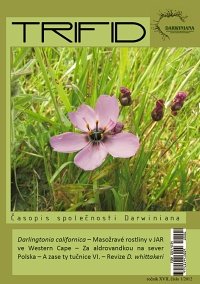Trifid 2012/1
- volume 17
- ISSN 1214-4134
- pages 44
Darlingtonia californica
Stewart McPherson (translation by Adam Veleba and Katka Králová)
In the article you can find not only a description of this interesting plant, but also information about its appearance and growing.
Carnivorous plants in the Republic of South Africa in Western Cape
Christian Dietz (translation by Drahuše Chovancová)
In the next voyage diary, we can look into the Republic of South Africa, where a small group of enthusiasts was looking for, as expected, carnivorous plants. The journey was not easy, but was ended successfully. Now we can read, which species they met.
To the north of Poland not only for Aldrovanda
Zbyněk Elingr, Klára Madejová
On their another journey, Zbyněk and Klára travelled further south than usually. Goal of their trip was our neighbouring country, Poland. They visited Polish national parks with all of their plant and animal residents. The way was focused on an area of the aquatic carnivorous plant Aldrovanda.
The second expedition – and Butterworts again – part VI.
Jaroslav Neubauer, Mirek Macák, Pepa Malínský
The another and, unfortunately, the last part of the article about the field trip and looking for European butterworts. Together with authors we will be exploring the territory of Spain and then slowly but surely we will go home. This time the story is species-variable and we can find several species: from common Pinguicula alpina to e.g. Pinguicula nevadensis.
Revision of D. whittakeri – part IV.
Allen Lowrie, John Godfrey Conran (translation by Zdeněk Žáček)
This last part contains a description of Drosera whittakeri.
The librarian introduces…
Adam Veleba
In this review, two titles are introduced: Sarraceniaceae of North America and Sarraceniaceae of South America. Both books were written by Stewart McPherson at al. As the title prompted, we can find there information about three different genera of carnivorous plants – Sarracenia, Darlingtonia and Heliamphora.
